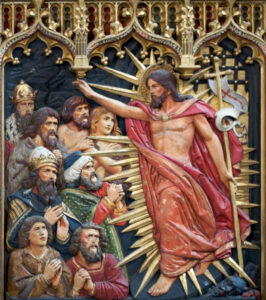Fr Neil’s homily for the Second Sunday of Advent, 5 December 2021
And I am sure that he who began a good work in you will bring it to completion at the day of Jesus Christ.¹
Our readings from scripture are about the preparing of the way for the coming of the Saviour; a Saviour who will provide the means of salvation in all fullness. This preparing of the way is a journey from captivity to freedom.
Baruch’s vision² follows the imagery of both the Exodus and the returning from Exile. The image is of a prepared way, with shaded pathways and joy and singing of the liberated children of God. They are on their way home into the presence of their God in a restored Jerusalem, the city of God.
This idealised vision fed the minds of the people of Israel in their longing for the appearance of the Messiah. It is also a spiritual vision that sees their physical captivity as a sign of their spiritual slavery to the sin, that they are being freed from.
Our celebration of Advent is also marked by this call to freedom and our journey from spiritual captivity to the liberty as the children of God and disciples of Christ.
We are a pilgrim people who gather together to worship, sing and pray with great joy in our anticipation of heavenly glory. We trust that the work of Christ begun in us will be brought to completion. It is why our cry this Advent should be; ‘Come Lord Jesus, come.’
In the meantime we are aware that we are still on this journey. There is much that still holds us captive as we seek to free ourselves from worldly attachments that hinder our capacity to follow Christ more closely and gain the prize of eternal glory.
It isn’t ‘worldly things’ in themselves that are the problem, but the false attachments we make of them. It is expecting worldly things to answer our deepest needs rather than those needs being met by God.
We are reminded this Advent to ask, ‘What is holding me captive?’ or ‘What am I afraid to let go of that hinders me walking more closely to Christ?’ For example: a sign of captivity might be our addiction to our smart phones and obsessions with Facebook, Instagram and the like. What is the first thing you do when you wake up in the morning?
There is another pandemic other than Covid, and research tells us that 90% of the younger generation have by the time they are fourteen years old been exposed to explicit material via new technology. Abusive texts among the young is a growing problem leading more than ever into an addiction to pornography.
Of course there is the well-known addiction to drink, drugs, domestic violence and gambling that many fall prey to in the false hope of escaping past traumas. In reality it only increases the misery for the individual and all those around them.
How many of us are held captive to fear and phobias? Fear can make us think and act irrationally. Fear can make us willing to give up our and other people’s civil liberties and including the right to informed consent. How often do we look to target groups of people to blame and vent our frustration upon? History should give us warning of the consequences of such actions. Think of the Jews, Romany people, migrants, people of colour, Roman Catholics, gays and now those who are unvaccinated. Any time groups are demonised and declared a threat or ‘unclean’, we should be very concerned. Currently, mandatory vaccines, restricted access to health care, vaccine passports, fines and even detention camps are already appearing around the world.
Fear is driving out any rational debate. There is the rise of a new morality where alternative opinions are seen as dangerous and need eradicating. This thinking is dictating policy decisions by governments, businesses and educational establishments.
In 1 John 4:18–20 we hear these profound words:
There is no fear in love, but perfect love casts out fear. For fear has to do with punishment, and he who fears is not perfected in love. We love, because he first loved us. If any one says, “I love God,” and hates his brother, he is a liar; for he who does not love his brother whom he has seen, cannot love God whom he has not seen.
I don’t know about you, but I know perfect love has not finished its work in me as I struggle to free myself from the many small things that hold me captive. However, I do know that we can trust in the promise that God has indeed ‘first loved us’ in Christ. That first love is revealed in his incarnation, life, death and resurrection. It enables us to hope with certainty that God will come to fulfil his promise of healing and renewing all things when Christ shall return again.
Praise be to God for his merciful love, which reaches out to us in our captivity so that he might free us as he has begun in us a good work. While we wait in joy and thanksgiving for that work to be brought to completion, we are ourselves to point to the way of freedom that is Christ.
This is our mission as baptised Christians to preach a baptism of repentance and forgiveness of sins, that help prepare the way of the Lord. We are to clear the junk that stands in the way of life in Christ so that “all flesh shall see the salvation of God.”
It is in the coming of our Lord that the work of salvation is brought to completion. His appearing is found in his word, in the celebration of the sacraments and finally in his return in glory.
Come, Lord Jesus, Come!
¹ Philippians 1:6
² Baruch 5
The editorial title comes from the antiphon O Clavis David.








 Posts
Posts